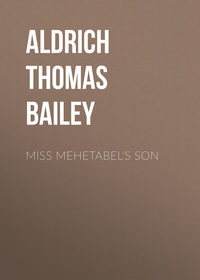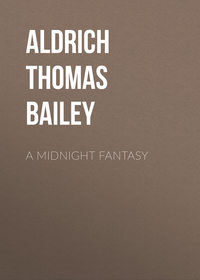 полная версия
полная версияThe Queen of Sheba, and My Cousin the Colonel
"Not at first, perhaps…but afterwards?"
"Neither now nor afterwards, Mr. Lynde."
"Why not?"
"He has other views for Ruth," said Mrs. Denham coldly.
"Other views!" repeated Lynde, paling. "I thought her free."
"She is not free in that sense."
The assertion Ruth had made to him the previous day on the mountain side, to the effect that she had never known any gentleman as intimately as she had known him, flashed across Lynde's memory. If Mr. Denham had views for her, certainly Ruth was either ignorant of them or opposed to them.
"Is Miss Ruth aware of Mr. Denham's intentions regarding her?"
"I must decline to answer you, Mr. Lynde," said Mrs. Denham, rising with something like haughtiness in her manner.
"You are right. I was wrong to speak at present. I cannot conceive what impelled me; it was neither the time nor the place. I beg you to consider everything unsaid, if you can, and I especially beg you not to mention this conversation in your note to Mr. Denham. The one important thing now is to have proper medical attendance for your niece. The rest will take care of itself."
Lynde bowed somewhat formally and was turning away, when Mrs. Denham laid her fingers lightly on the sleeve of his coat. "I am sorry I have pained you," she said, as if with a touch of remorse.
"I confess I am pained," he replied, with the faintest smile, "but I am not discouraged, Mrs. Denham."
A quarter of an hour later Lynde was on the way to Geneva. Life and the world had somehow darkened for him within the hour. It seemed to him incredible that that was the same road over which he had passed so joyously two days before. The swollen torrents now rushed vengefully through the arches of the stone bridges; the low-hanging opaque clouds pressed the vitality out of the atmosphere; in the melancholy gray light the rain-soaked mountains wore a human aspect of dolor. He was not sorry when the mist gathered like frost on the carriage windows and shut the landscape from his sight.
The storm had been terrible in Geneva and in the neighborhood. It was a scene of devastation all along the road approaching the town. Most of the trees in the suburbs had been completely stripped of foliage by the hailstones; the leaves which still clung to the bent twigs were slit as if volleys of buckshot had been fired into them. But the saddest thing to see was field after field of rich grain mown within a few inches of the ground by those swift, keen sickles which no man's hand had held. In the section of the city through which Lynde passed to the railroad the streets were literally strewn with broken tiles and chimney-pots. In some places the brown and purple fragments lay ankle-deep, like leaves in autumn. Hundreds of houses had been unroofed and thousands of acres laid waste in a single night. It will take the poor of the canton fifty years to forget the summer storm of 1875.
By noon the next day Lynde was in Paris. As he stepped from the station and stood under the blue sky in the sparkling Parisian atmosphere, the gloom and desolation he had left behind at Geneva and Chamouni affected him like the remembrance of a nightmare. For a brief space he forgot his sorrowful errand; then it came back to him with its heaviness redoubled by the contrast. He threw his valise on the seat of a fiacre standing near the crossway, and drove to the office of Galignani in the Rue de Rivoli—the morgue in which the names of all foreign travellers are daily laid out for recognition. The third name Lynde fell upon was that of William Denham, Hotel Meurice. The young man motioned to the driver to follow him and halt at the hotel entrance, which was only a few steps further in the arcade facing the gardens of the Tuileries.
Mr. Denham was at breakfast in the small salon opening on the paved square formed by the four interior walls of the building; he had just seated himself at the table, which was laid for two persons, when the waiter brought him Mrs. Denham's note and Lynde's card. Mr. Denham glanced from one to the other, and then broke the seal of the envelope with a puzzled air which directly changed into a perturbed expression.
"Show the gentleman in here," he said, speaking over the top of the note-sheet to the servant, "and set another cover."
It was a strongly featured person of fifty or fifty-five, slightly bald, and closely shaven with the exception of a heavy iron-gray mustache, who rose from the chair and stepped forward to meet Lynde as he entered. Lynde's name was familiar to Mr. Denham, it having figured rather prominently in his wife's correspondence during the latter part of the sojourn at Geneva.
"You have placed us all under deep obligations to you, sir," said Mr.
Denham, with a smile in which the severity of his features melted.
"The obligations are on my side, sir," replied Lynde. "I owe Mrs. Denham a great many kindnesses. I wish I could have found some happier way than the present to express my sense of them."
"I sincerely hope she was not justified in allowing you to take this long journey. I beg of you to tell me what has happened. Mrs. Denham has been anything but explicit."
She had merely announced Ruth's illness, leaving it to Lynde to inform Mr. Denham of the particulars. That gentleman wrinkled his brows involuntarily as he listened to Lynde's account of his mountain excursion alone with Ruth and the result. "I have not seen Miss Denham since," said Lynde, concluding his statement, in which he had tripped and stumbled woefully. "I trust that Mrs. Denham's anxiety has exaggerated her niece's condition."
"Ruth is far from strong," replied Mr. Denham, "and my wife is almost morbidly quick to take alarm about her. In fact, we both are. Do you know how the trains run to Geneva? Is there anything earlier than the evening express?"
Lynde did not know.
"We will ascertain after breakfast," continued Mr. Denham. "Of course you have not breakfasted yet. You ought to be in appetite by this time. I am unusually late myself, this morning, and my friend, the doctor, is still later. We tired ourselves out yesterday in a jaunt to Fontainebleau. The doctor's an incorrigible sightseer. Ah, there he is! Mr. Lynde, my friend, Dr. Pendegrast."
Lynde did not start at hearing this unexpected name, though it pierced his ear like a sharp-pointed arrow. He was paralyzed for an instant; a blur came over his eyes, and he felt that his hands and feet were turning into ice However, he made an effort to rise and salute the elderly gentleman who stood at his side with a hand stretched out in the cordial American fashion.
Evidently Dr. Pendegrast did not recognize Lynde, in whose personal appearance three years had wrought many changes. The doctor himself had altered in no essential; he was at that period of man's life—between fifty and sixty—when ravaging time seems to give him a respite for a couple of lustrums. As soon as Lynde could regain his self-possession he examined Dr. Pendegrast with the forlorn hope that this was not HIS Dr. Pendegrast; but it was he, with those round eyes like small blue-faience saucers, and that slight, wiry figure. If any doubt had lingered in the young man's mind, it would have vanished as the doctor drew forth from his fob that same fat little gold watch, and turned it over on its back in the palm of his hand, just as he had done the day he invited Lynde to remain and dine with him at the asylum.
"Why, bless me, Denham!" he exclaimed, laying his ear to the crystal of the time-piece as if he were sounding a doubtful lung, "my watch has run down—a thing that hasn't happened these twenty years." As he stood with his head inclined on one side, the doctor's cheery eyes inadvertently rested upon Mr. Denham's face and detected its unwonted disturbance.
"Mr. Lynde has just come from Chamouni," said Mr. Denham, answering the doctor's mute interrogation. "It seems that Ruth is ill."
Dr. Pendegrast glanced at Lynde and turned to Mr. Denham again.
"I imagine it is only a cold," Mr. Denham continued. "She was caught in a rain-storm on the mountain and got very wet. Mrs. Denham is of course worried about her, and Mr. Lynde has been kind enough to come all the way to Paris for us."
"That WAS very kind in him."
Dr. Pendegrast drew a chair up to the table and began questioning Lynde. Beyond satisfying such of the doctor's inquiries as he could, Lynde did not speak during the meal. He managed to swallow a cup of black coffee, which revived him; but he was unable to eat a mouthful. The intelligence he had brought so occupied his companions that the young man's very noticeable agitation and constraint escaped them. In a few minutes Mr. Denham rose from his seat and begged the two gentlemen to finish their breakfast at leisure, while he went to consult the time-table at the bureau of the hotel.
"The doctor can give you a genuine Havana," he remarked to Lynde. "I will join you shortly in the smoking-room."
While Dr. Pendegrast silently drank his coffee, Lynde pieced his scattered thoughts together. What course should he pursue? Should he take the doctor into his confidence, or should he let himself drift? How could the doctor help him in the circumstances? Ruth had been insane. What could do away with that dreadful fact, the revelation of which now appalled him as if he had never suspected it. Ruth, Ruth—the very name was significant of calamity! Flemming's words rang in his ears: "You would not marry her!" He had not replied to Flemming that night when the case was merely supposititious. But now—it seemed to Lynde that he had never loved Ruth until this moment. The knowledge of her misfortune had added to his love that great pity of which he had spoken to his friend. But could he marry her? He did not dare put the question squarely, for he dared not confess to himself that he could not give her up. This, then, was the key to Mrs. Denham's cold rejection of his suit; it explained, also, Ruth's unwillingness to have him speak to her of his love. How poignant must have been her anguish that day on Montanvert if she cared for him! She loved him—how could he doubt it?—but she had accepted the hopelessness of the position. In his own mind he had accused her of coquetry in their walk at the cascade of Nant d'Arpenaz. He saw through it all now; the scales had fallen from his eyes. She was hiding her misery under a smooth face, as women will. A sudden reflection sent a chill over Lynde; what if she had recognized him that first day at dinner in Geneva and had been playing a part all the while! Then she was the most subtile actress that ever lived, and the leading lady of the Theatre Francais might indeed go and take lessons of her, as Flemming had said. The thought gave Lynde a shock. He would not like to have the woman he loved such an actress as that. Had Ruth revealed everything to the aunt, and was she too playing a part? In her several allusions to Dr. Pendegrast Mrs. Denham had called him "the doctor" simply, or "an old friend of our family," and never once pronounced his name. "Was that accidental or intentional?" Lynde wondered. "It was inevitable that he and I should meet sooner or later. Was she endeavoring to keep the knowledge of Dr. Pendegrast from me as long as possible? The exigency has unmasked her!"
"Now, Mr. Lynde, I am at your service."
Lynde gave a start, as if the doctor had suddenly dropped down at his side from out of the sky.
Dr. Pendegrast pushed back his chair and led the way across the quadrangle, in which a number of persons were taking coffee at small tables set here and there under oleander-trees in green-painted tubs. The smoking-room was unoccupied. Lynde stood a moment undetermined in the centre of the apartment, and then he laid his hand on the doctor's shoulder.
"You don't remember me?"
"Ah, then I HAVE seen you before!" exclaimed Dr. Pendegrast, transfixed in the act of drawing a cigar from his case. "Your name and your face puzzled me, but I could not place you, so I didn't mention it. You must pardon an old man's bad memory. I am confused. When and where have I had the pleasure of seeing you?"
"It was scarcely a pleasure," said Lynde, with bitterness.
"Indeed! I cannot imagine that; it is a pleasure now," returned the doctor courteously. "It was three years ago, at your asylum. As you will recollect, I was brought there by mistake the day the patients"—
"Bless me!" exclaimed the doctor, dropping the ignited match. "How could I forget you! I took such a great liking to you, too. I have thought of that awkward affair a thousand times. But, really, coming across you in this unexpected manner"—
"I suppose I have changed somewhat," Lynde broke in. "Dr. Pendegrast, I am in a very strange position here. It is imperative you should be perfectly frank with me. You will have to overlook my abruptness. Mr. Denham may return any instant, and what I have to say cannot be said in his presence. I know that Miss Denham has been under your charge as a patient. I want to know more than that bare circumstance."
The doctor recoiled a step. "Of course," he said, recovering himself, "you must have recognized her."
"I met your friends six or seven weeks ago at Geneva," continued Lynde. "I recognized Miss Denham at once; but later I came to doubt and finally to disbelieve that I had ever seen her elsewhere. I refused to accept the testimony of my eyes and ears because—because so much of my happiness depended on my rejecting it."
"Does Mrs. Denham know that you are in possession of the fact you mention? Denham of course doesn't."
"No; it is my meeting with you that he turned my discarded doubt into a certainty."
"Then, I beg of you," said Dr. Pendegrast throwing a glance across the quadrangle, "not to breathe a syllable of this; do not even think of it. It has been kept from every one—from even the most intimate friends of the family; Ruth herself is not aware of her temporary derangement."
"Miss Denham does not know it?"
"She has not the remotest suspicion of the misfortune which befell her three years ago."
"Miss Denham does not know it?" repeated Lynde in a dazed way.
"That—that seems impossible! Pardon me. How did it happen, Dr.
Pendegrast?"
"I assume that you are not asking me through idle curiosity," said the doctor, looking at him attentively.
"I have vital reasons for my question, Doctor."
"I do not see why I should not tell you, since you know so much. The family were in Florida that spring. Ruth had not been well for several months; they had gone South on her account. It was partly a pulmonary difficulty. On their return North, Ruth was prostrated by a typhoid fever. She recovered from that but with her mind strangely disordered. The mental malady increased with her convalescence. Denham and I were old friends; he had faith in my skill, and she was placed in my care. She was brought to the asylum because I could not attend to her anywhere else. I considered her case serious at first, even hopeless. The human body is still a mystery, after science has said its last word. The human mind is a deeper mystery. While I doubted of her recovery, she recovered. At the first intimation of returning health, she was taken home; when her wandering thought came back to her she was in her own room. She remembered that she had been very ill, a long time ill; she had a faint impression that I had attended her meanwhile; but she remembered nothing more. The knowledge of her affliction was kept a secret from her—unwisely, I think. They put it off and put it off, until it became very awkward to tell her."
Lynde started as he recalled his conversation with Miss Denham on the
rocks overhanging the Mer de Glace. With unwitting cruelty he had told
Ruth her own pathetic story, and she had unconsciously pitied herself!
A lump came into his throat as he remembered it.
"That was a mistake," said Lynde, with an effort, "not to tell her."
"An absurd mistake. It has given my friends no end of trouble and embarrassment."
"How long was she afflicted this way?"
"Something less than two months."
"It was the result of the fever?"
"That chiefly."
"It was not—hereditary?" Lynde lingered on the word.
"No."
"Then it is not likely to occur again?"
"I cannot think of anything more unlikely," returned the doctor, "unless the same conditions conspire, which is scarcely supposable, as I could easily prove to you. You can understand, Mr. Lynde, that this has been a sore trial to Denham and his wife; they have had no children, and their hearts are bound up in Ruth. The dread of a recurrence of the trouble has haunted them night and day in spite of all the arguments I could advance to reassure them. They have got what our French friends call a fixed idea, which is generally an idea that requires a great deal of fixing. The girl ought to marry—every woman ought to marry, it is her one mission; but between their affections and their apprehensions, my friends have allowed Ruth no opportunity to form attachments."
"I'm glad of that," said Lynde quietly.
"Are you!" snapped the doctor. "I am not. I would like to see her married some day. Meanwhile I would like to see a dozen lovers about her. It is as natural for a young girl to coquet as it is for a canary to peck at its seed or trim its bill on a bit of fishbone. It is had for the girl and the canary when they are prevented."
"There is something human in this crisp old doctor," said Lynde to himself, and then aloud: "So Mr. Denham has no matrimonial plans for her?"
"None whatever. Since Ruth's recovery the family have been constantly on the wing, either at home or abroad. Most of Ruth's life has been passed over here. I trust to your discretion. You will perceive the necessity of keeping all this to yourself."
"I do, and I now see that your travelling with the Denhams is a circumstance in no way connected with the state of Miss Denham's health."
"Not in the most distant manner, Mr. Lynde. I am with them because they are my old friends. I was worn out with professional work, and I ran across the sea to recuperate. It is fortunate I did, since Ruth chances to need me."
Lynde pondered a moment, and then asked abruptly: "Does Mrs. Denham know of my former meeting with her niece?"
"I never breathed a word to Mrs. Denham on the subject of Ruth's escapade," replied the doctor. "It would have pained her without mending matters. Besides, I was not proud of that transaction."
Mrs. Denham's suppression of the doctor's name, then, in speaking of him to Lynde, had been purely accidental.
"Miss Ruth's strange hallucination, in her illness, as to personality, her fancy about the Queen of Sheba—what was that traceable to?" asked Lynde, after a pause.
"Heaven only knows. She was reading the Old Testament very much in those days. I have sometimes accepted that as an explanation. It often happens that a delusion takes its cue from something read, or thought, or experienced in a rational state. In the case of the man Blaisdell, for example—you remember him, with his marble ship? He was formerly an enterprising ship-builder; during the Southern war he filled a contract with government for a couple of ironclads, and made his fortune. The depression in shipping afterwards ruined him—and he fell to constructing marble vessels! He is dead, by the way. I wonder if his reason has been given back to him—in that other world."
Lynde did not speak immediately, and the doctor relighted his cigar, which had gone out.
"Dr. Pendegrast, you have lifted a crushing weight from me. I cannot explain it to you now and here; but you shall know some day."
Dr. Pendegrast smiled. "I didn't recollect you at first, Mr. Lynde; my memory for names and faces is shockingly derelict, but I have retained most of my other faculties in tolerably good order. I have been unreserved with you because I more than suspect"—
The doctor's sentence was cut short by Mr. Denham, who entered at the instant. He had learned that there was no train for Geneva before the night-express. Lynde lighted the cigar which he had been unconsciously holding between his fingers all this while, and on the plea of cashing a draft at a banker's left the two gentlemen together. He wandered absently into the Place de la Concorde, crossed the crowded bridge there, and plunged into the narrow streets of the Latin Quarter. Finding his way back after an hour or so to the other bank of the Seine, he seated himself on one of those little black iron chairs which seem to have let themselves down like spiders from the lime-trees in the Champs Elysees, and remained for a long time in a deep study.
The meeting with Dr. Pendegrast had been so severe a shock to Lynde that he could not straightway recover his mental balance. The appalling shadow which the doctor's presence had for the moment thrown across him had left Lynde benumbed and chilled despite the reassuring sunshine of the doctor's words. By degrees, however, Lynde warmed to life again; his gloom slipped off and was lost in the restless tides of life which surged about him. It was the hour when Paris sits at small green tables in front of the cafes and sips its absinthe or cassis; when the boulevards are thronged, and the rich equipages come and go. There was not a cloud in the tender blue sky against which the reddish obelisk of Luxor looked like a column of jet; the fountains were playing in the Place de la Concorde, and in the Tuileries gardens beyond the breeze dreamily stirred the foliage which hid from Lynde's view the gray facade of the gutted palace, still standing there, calcined and cracked by the fires of the Commune. Presently all this began to distract him, and when he returned to the hotel he was in a humor that would have been comparatively tranquil if so many tedious miles had not stretched between Paris and Chamouni.
He found Mr. Denham and Dr. Pendegrast delaying dinner for him. After dinner, seeing no prospect of renewing conversation in private with the doctor, Lynde killed the time by writing a voluminous letter to Flemming, whose name he had stumbled on in the passenger-list of a steamer advertised to sail two days later from Liverpool.
As Lynde took his seat in the railroad carriage that night he had a feeling that several centuries had elapsed since daybreak. Every moment was a month to him until he could get back to Chamouni. The thought that Ruth might be dangerously ill scarcely presented itself among his reflections. She was free, he loved her, and there was no reason why he should not try to win her, however strongly the Denhams might be opposed to him. His mind was perfectly easy on that score; they had no right to wreck the girl's future in their shallow fear. His two travelling companions shortly dropped asleep, but Lynde did not close his eyes during those ten weary hours to Macon. Thence to Geneva was five hours more of impatience. At Geneva the party halted no longer than was necessary to refresh themselves at a buffet near the station and hire a conveyance to Chamouni, which they reached two or three hours after sunset. The town still lay, as Lynde had left it, in the portentous shadow of the mountain, with the sullen rain dropping from the black sky.
Lynde drew an alarming augury from the circumstance that Mrs. Denham did not come down to greet them. It dawned upon him then for the first time with any distinctness that Ruth might be fatally ill. Mr. Denham, accompanied by Dr. Pendegrast, hastened to his wife's apartments, and Lynde stationed himself at the head of a staircase in the hall, where he waited nearly an hour in intolerable suspense before the doctor reappeared.
"What is it, Doctor?"
"Pneumonia. No," he added, divining Lynde's unspoken thought even before it had fairly shaped itself in his brain, "it is not the other business."
"You are hiding the truth from me," said Lynde, with a pang. "She is dead!"
"No, but she is very low. The disease is approaching a crisis; a change must take place by to-morrow. Frankly, I dread that change. I am hiding nothing from you."
"Is there no hope? You do not mean that!"
"I am afraid I do. Perhaps it is because she is so dear to me that I always anticipate the worst when she is concerned. The other physician is more sanguine; but then he does not love Ruth as I do."
"You might have saved her!"
"Everything has been done that could be done. He is a person of remarkable skill, this Paris physician. I could have advised no change in his treatment of the case if I had been on the spot at first. That is a great deal for one physician to say of another. You had better go and get some rest," added Dr. Pendegrast in a changed voice, struck by the young man's ghastly look. "Your two night-journeys have used you up."









